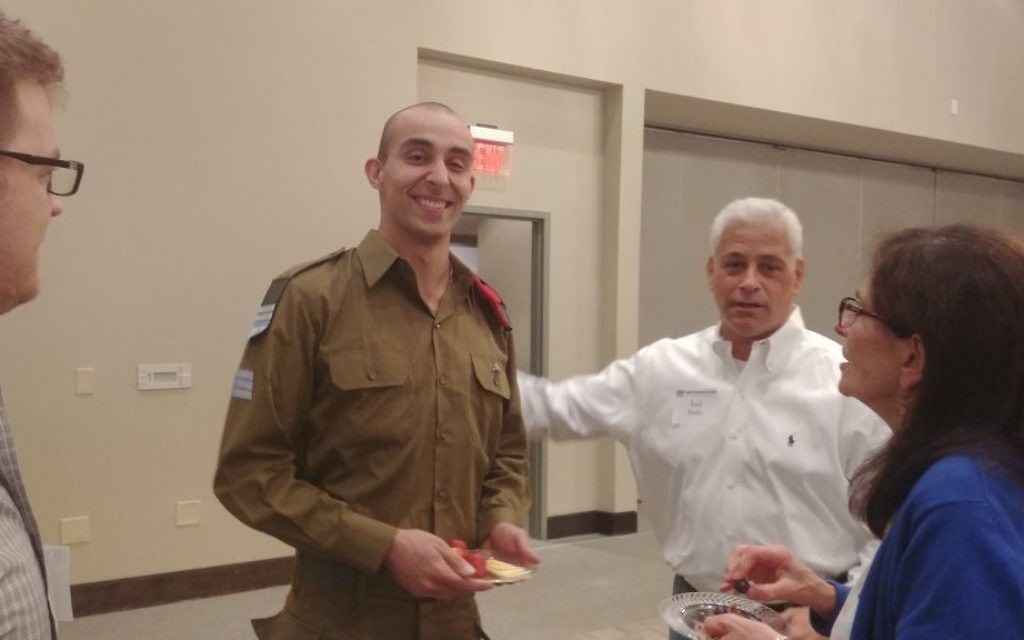Sniper Instructor: FIDF Donations Crucial
A soldier shares his views of life close to Gaza at an FIDF lecture celebrating Israel's birthday.

His military friends called him an idiot for eating sandwiches with sand and standing in the sun when he could be partying at college, but Israel Defense Forces Sgt. Yaniv’s cultural connection to Israel represented a stronger calling.
The 22-year-old was born in Be’er Sheva and grew up in Jerusalem before moving to Seattle, where he lived for nine years. At 18, Yaniv joined Tzofim Garin Tzabar, one of many organizations affiliated with the Israeli Scouts, and performed his service as a lone soldier.
Yaniv lived at Kibbutz Kissufim, a stone’s throw from the Gaza border — a great place to live, he said, during Operation Protective Edge in the summer of 2014.
Get The AJT Newsletter by email and never miss our top stories Free Sign Up
The rockets and mortars from Hamas, as well as its terror tunnels, heavily affected the kibbutz, Yaniv explained to a packed room at the Friends of the IDF Israel 70 Speakers Series event Wednesday, April 11, at Temple Sinai.
Because Yaniv has a medical condition, he was excused from Israel’s mandatory military service, yet he decided to volunteer.
He first served as special mission support staff for Yamas, an undercover unit that disguises soldiers as Arabs and operates in the West Bank. While on duty, Yaniv also helped plan and piece together intelligence to ensure that soldiers were well prepared for high-risk operations.
In the military, Yaniv said, he served with soldiers from poverty-stricken neighborhoods in the South and with men who lived in rich areas in the North or Tel Aviv.
Israel is a huge melting pot, Yaniv said, so the soldiers come from every background.
“Some are combat soldiers, some are combat support soldiers, and some are further away from the combat line. But we all share the common bond of being Israeli soldiers and serving to protect the state of Israel,” he said.
With immigrants from Russia, Ethiopia and the United States, for example, a common language can be an issue.
Civilians often don’t know how complex militaries are, Yaniv said. “Everything needs to be tightly coordinated, which makes for a controlled and efficient body during wartime.”
Yaniv was transferred to a school for counterterrorism, where he received training to become a sniper instructor. He spent most of his service in the school, which is subordinate to the airborne and special forces command.
The instructors teach soldiers specialized military jobs, which include hostage rescue, tunnel warfare and sniping. Within a year after Operation Protective Edge, Yaniv’s unit centralized, developed and instituted the armywide doctrine for tunnel warfare.
Because Yaniv speaks English and Arabic, he also participated in some key projects that allowed him to cross-train with American forces. He posed as a terrorist leader in a nationwide hostage rescue drill and held his own in negotiations with Israel’s elite counterterrorism units, Yamam and Sayeret Matkal.
Recently, Yaniv wrote and implemented the sniper camouflage field manual.
“IDF soldiers come from diverse cultures, speak many languages and perform different functions in the military,” Yaniv said. “Yet there is one thing that unites Israeli’s soldiers in the military, and that is support of organizations such as FIDF, which is funded through generous donors.”
He added, “I really do appreciate all your donations, and, in the words of Naftali Bennett, 6 million is a price that we pay when we don’t have a nation. The relationship between Israel and the Jewish communities abroad is invaluable and irreplaceable.”




comments